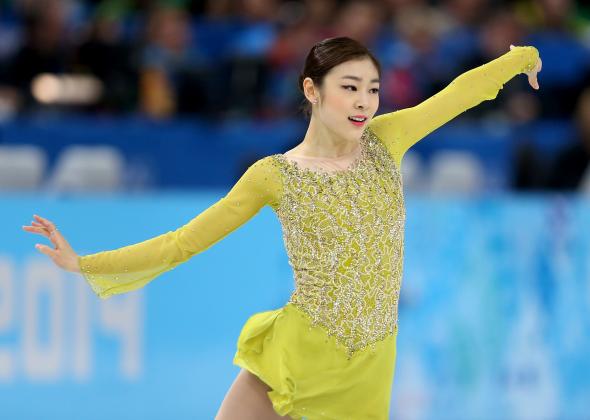According to the New York Times, reigning Olympic figure skating champion Kim Yu-na—the oft-dubbed “Ice Queen” of South Korea—is among the favorites to earn a place on the podium in Sochi. Reuters, however, says it’s Kim Yuna who hopes to defend her brilliant victory in Vancouver. And over at USA Today, it’s Yuna Kim. What gives?
With the exception of James Bond, Westerners typically introduce themselves with their given name first and their surname, or last name, second. And with the exception of alphabetized lists, like in a phone book, that’s also how we write them. It’s known as Western order and is the standard in most of Europe and North and South America. In much of East Asia, however, including China, Japan, and Korea, Eastern order, putting the last name first, is the norm, emphasizing the traditional clanlike significance of the family name.
Since Kim is the Korean skater’s last name, Eastern order instructs us to give her name as either Kim Yuna or Kim Yu-na.
There are only a couple hundred or so surnames in Korea and almost all of them are a single syllable. Astoundingly, more than a fifth of Koreans have the family name Kim, with nearly another quarter claiming Lee or Park. First names, on the other hand, are more varied and often have two syllables. As the Wall Street Journal pointed out recently, the National Institute of the Korean Language issues guidelines for the transliteration of Korean words into Roman characters, according to which first-name syllables are to be separated by a hyphen. The recommended Romanization of Kim’s first name is Yeon-a.
So how did we get from Yeon-a to Yu-na? One story that’s gone around is that Yu-na was simply a misspelling, either by Kim’s mother or a government official, that made its way onto her passport. So Kim Yu-na became her name in the Latin alphabet. (Some outlets, including Slate, referred to the skater as Kim Yu-Na during the 2010 Games. The default spelling for most Korean first names, however, is post-hyphen lowercase.)
Kim Yu-na is a perfectly fine name, of course—except it’s not what Kim prefers. She’s been registered in the International Skating Union (ISU) as Yuna Kim since 2010, her website—yunakim.com—refers to her as Yuna Kim, and her management agency has asked that Yuna Kim be used by the Associated Press, which issued the following statement to editors:
At the athlete’s request, The Associated Press has started referring to the Olympic figure skating champion as Yuna Kim. Kim was previously referred to as Kim Yu-na, which is in AP style for South Korean names when the person has not expressed a preference for an English transliteration.
Which leaves us with Yuna Kim—and that’s the style Slate will now use.
Incidentally, Kim is derived from the Chinese character meaning “gold.”* If 2014 plays out anything like 2010, Kim will soon mean gold everywhere.
*Update Feb. 26, 2014: Haewon Cho, director of the Korean Language Program at UPenn, points out: “As for the surname 金, it means gold, metal, or the last name Kim. When it denotes the last name or place names, it does not seem to be associated with gold or metal anymore.” This post has been updated to clarify the meaning of Kim.
